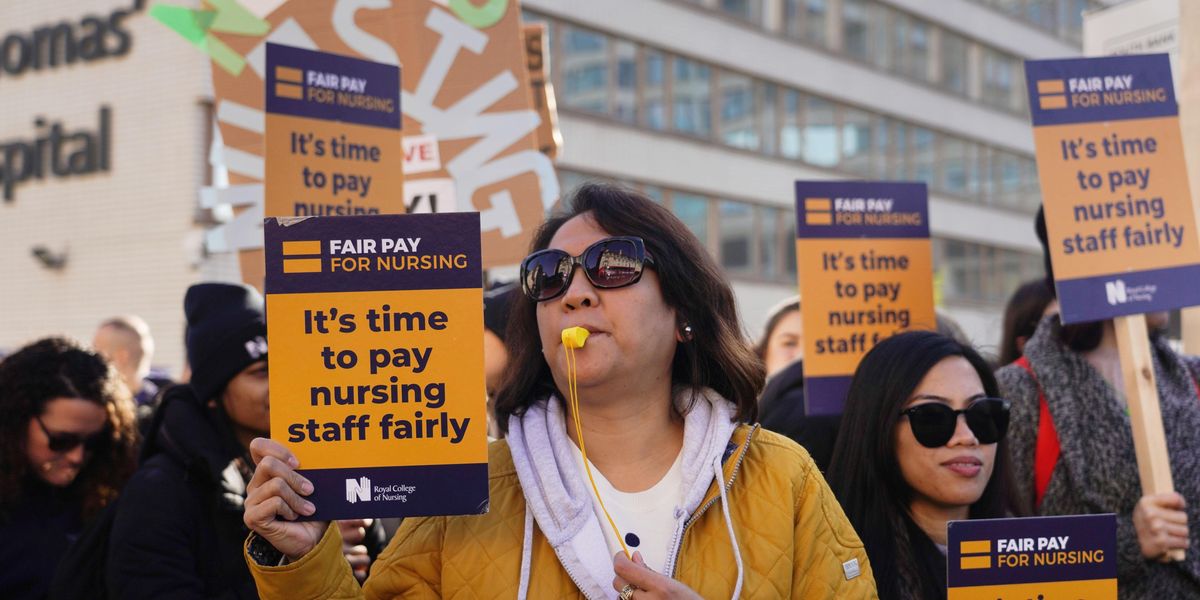
Condemning the United Kingdom’s Conservative-controlled government for putting “patients at risk” by refusing to pay nurses fairly and forcing healthcare providers out of the profession, tens of thousands of nurses and ambulance workers joined forces on Monday to stage the largest work stoppage in the history of the venerated National Health Service.
The workers, who along with teachers and other public and private sector employees have gone on several strikes separately over the past several months, are calling on Prime Minister Rishi Sunak’s government to return to the bargaining table with unions including the Royal College of Nursing (RCN), Unite, and GMB and negotiate higher wages and better working conditions.
The unions initially called for a pay raise of 5% above inflation, which stood at 9.2% in December, but were offered a raise of just 4.75% on average. The nation’s 14 health unions have rejected the Tories’ calls for them to accept the offer.
Hospital executives have also called on the government to reopen negotiations for their workers, who earn less than £30,000 ($36,000) per year in the case of newly qualified nurses. Paramedics take home salaries in the low £30,000 range, while specialist nurses earn roughly £45,000.
Ahead of Monday’s strike, 100,000 members of the RCN signed an open letter warning that years of low pay have driven tens of thousands of nurses to leave the profession, including 25,000 over the last year—contributing to long waits for care and harming patient safety.
“The NHS is the bedrock of modern Britain,” said the nurses. “And it is crumbling. Nursing staff make up more than half of the NHS workforce, and they are pushed beyond their limits. Care is not safe and the public pays the price. On behalf of the nursing profession, I implore you to see sense. Protect nursing to protect the public.”
A number of signs on picket lines across Britain on Monday alluded to patient safety.
\u201cUp the striking ambulance workers! \ud83d\ude91\n\n\ud83d\udcf8 @GMBCampaigns picket line in Gateshead today\u201d— Enough is Enough (@Enough is Enough) 1675689572
Officials in Sunak’s government have focused on the disruption to healthcare the strikes could cause, with Health Minister Steve Barclay saying, “Strikes by ambulance and nursing unions this week will inevitably cause further delays for patients who already face longer waits due to the Covid backlogs.”
One striking worker on a picket line in London held a sign reading, “Strikes are meant to be disruptive.”
Not all ambulance workers are going on strike at the same time and emergency calls are still being answered, France24 reported, and about a third of nurses in the U.K. will not be on strike this week.
RCN nurses will continue their strike on Tuesday, while ambulance workers will stage a second work stoppage on Friday and physiotherapists plan to walk out on Thursday.
“They aren’t just fighting for themselves—they’re fighting for the NHS,” said the Enough Is Enough campaign, a grassroots movement in the U.K. that has been leading the call for the government to address the cost-of-living crisis in the country and demanding Sunak’s government “tax the rich” to ensure fair wages for workers.
\u201cSupport your local nurses! \ud83d\udc4a\n\nThousands of nurses are on strike across England today.\n\nThey aren\u2019t just fighting for themselves \u2013 they\u2019re fighting for the NHS.\n\nFind a picket line near you: https://t.co/wm7nkfgPyP\u201d— Enough is Enough (@Enough is Enough) 1675671085
About 500,000 U.K. workers, largely in the public sector, have held walkouts since last summer. Last week about 300,000 educators went on strike with the support of 59% of Britons despite the fact that the walkout forced an estimated 85% of schools to close.
Last month, a poll by The Observer found that about 57% of people supported the planned strike by nurses and 52% were in favor of ambulance workers walking out to demand fair pay.
This post was originally published on Common Dreams.
 (@LeftWingAgency)
(@LeftWingAgency) 
 (@Haggis_UK)
(@Haggis_UK)